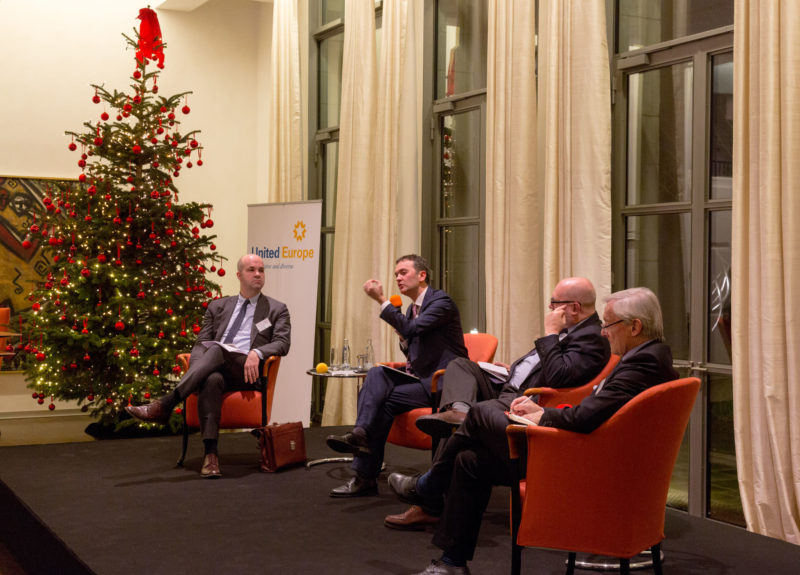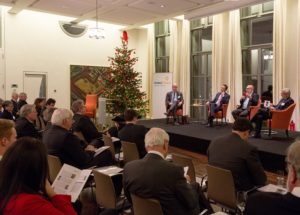
Under the topic “A Window for EU Reform – How to strengthen the Euro” United Europe had invited members and personalities from politics and economy to a panel discussion on December 12 at Würth Haus Berlin. At the end of a year of crucial European elections, an outstanding panel discussed the different proposals for strengthening the Euro. The panel included Professor Dr. Marcel Fratzscher, Professor Filippo Taddei and Thomas Wieser.
Professor Dr. Fratzscher is President of DIW Berlin, one of the leading, independent economic research institutes and think tanks in Europe, Professor of Macroeconomics and Finance at Humboldt- University Berlin, and Chair of the German government expert committee on „Strengthening investment in Germany“.
Professor Filippo Taddei has been teaching international finance and macroeconomics at SAIS Johns Hopkins University, where he is also Director of the Bologna Institute for Policy and Research (BIPR) and Director of the Master of Global Risk (MAGR).
Thomas Wieser is President of the Euro Working Group and of the European Financial Committee, the groups of deputies to finance ministers of the Eurogroup and of the Ecofin.
Moderated by United Europe President Dr. Wolfgang Schüssel, the three experts debated about following questions: Does the current fragile German government bears consequences to the constitution of the Euro and the Euro zone? What’s the absolute minimum for the Euro to make it work in the next few years? How can European institutions contribute a real support for national reforms and integration? What reform of the Euro will be necessary and possible in the next few years? And what is expected from Germany?
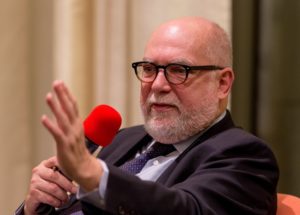
Wieser stated, that strengthening the idea of good governance is most important. “We will need to share more sovereignty in order to retain our independence! But one only shares risks if one has a say in how they are managed.” Wieser’s statement unveiled the key issue of the current Euro debate: introducing one stable currency in a multilateral union requires a massive transfer of sovereignty. This didn’t happen when the European Union introduced the Euro. In fact, the Euro was regarded as a comfortable common single method of payment. It was also used for comfortable fiscal transfers. But in fact, the Euro has a monetary function; to fully unfold the Euro’s monetary function the Euro-member states must transfer sovereignty to the European Union.
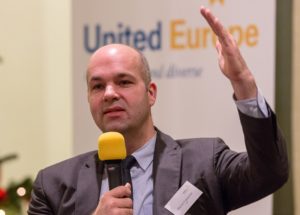
Prof. Dr. Fratzscher agreed and emphasized: „A successful Europe does not need a political union, but a clever combination of subsidiarity and integration”.
The idea of having the Euro has been misperceived for too long. The experts agreed on the fact that the Euro-discussion must move beyond the solidarity questions – no blame games anymore. Fratzscher said, that further convergence is needed. “It is absolutely crucial for Europe to keep up in the global competition.”
In the audience, the question was raised how to deal with the challenge coming from China and the US. In fact, Europe can only keep up when it increases its productivity and competitiveness in order to achieve a higher productivity. Spain has undergone sincere and painful reforms and has now an economic growth that is above the EU average. Italy and France would need similar reforms, but the experts are very pessimistic about the political willingness for future reforms – even in France, despite Macron’s announcements. The audience remarked that financial markets are perceptibly concerned about future developments, due to political uncertainties.
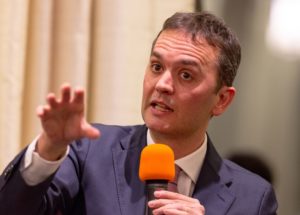
Professor Taddei hit the nail on the top when he stated: “The relevant question is how to make European institutions a real support for national reforms and integration, rather than an often-distant observer. Rather than asking about the survival of the Euro, we should ask how to make Europe useful in the Europeans’ mind.”
When it comes to national reforms and European integration the audience was very much concerned about the “two-pace-Europe”. Wieser replied that a two-pace-Europe is the wrong debate, as a differentiated Europe can be divisive.
Moreover, Emmanuel Marcron’s suggestions were brought up and discussed, among them the interesting question on the EU budget and its future distribution.
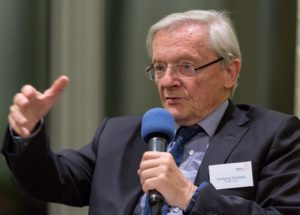
Schüssel suggested more flexibility for investments and smarter spending. “Instead of always asking for more funds, we should rather focus on the more efficient use of the existing ones. Furthermore, he referred to the Monti Report. There, everybody can read that the single European market is not finished yet. “If more money is needed, we should recall the fact that a fully implemented single market brings a potential of a 1,5% additional growth.”
Fratzscher concluded that Europe is at a crossroad today. “It has the unique chance to reinvent itself and to fundamentally reform and redefine the union. Germany and France must take over more responsibility for Europe and lead by example”.



